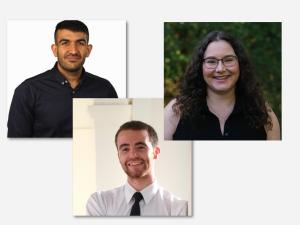Event Actions
Name: Soroush Zare
Bio: Soroush Zare is a Ph.D. candidate in Mechanical Engineering at the University of Virginia. His research focuses on brain-machine interfaces, wearable robotics, and artificial intelligence for rehabilitation applications. His work explores EEG-based motor intention decoding to enable intuitive control of robotic exoskeletons for upper-limb rehabilitation.
“EEG-Driven Robotics Control for Intent Validation and Adaptive Rehabilitation Using Feedback-Driven Learning”
Abstract: This research explores EEG-based brain-machine interfaces combined with robotics and artificial intelligence to advance neurorehabilitation and assistive technologies. Key areas include motor imagery classification for intuitive human-robot interaction, reinforcement learning for adaptive robotic control, and transformer-based models for EEG signal processing. A major focus is the development of a wearable soft exoskeleton that utilizes EEG signals for real-time movement control, enhancing rehabilitation for individuals with motor impairments. These advancements aim to improve the accuracy and responsiveness of brain-computer interfaces, enabling more effective and natural interaction with robotic systems.
Name: Kevin Fletcher
Bio: Kevin is a 4th year PhD student in Dr. Eric Loth's Fluids Research and Innovation Laboratory. His research focuses on the design and analysis of floating offshore wind turbines and more generally wind energy systems. He graduated from the University of Virginia in 2021 majoring in Aerospace Engineering.
“Flexible-Joint Floating Offshore Wind Turbine Platforms”
Abstract: Offshore wind resources offer a tremendous opportunity for wind energy adoption due to the ability to access higher mean wind speeds, build larger turbines, and site turbines closer to major coastal communities. One of the major challenges for floating offshore wind turbines is their high cost to generate energy, which has led to very limited deployment (less than 0.02% of worldwide wind capacity) despite abundant deep-water wind energy resources. As such, I am interested in the design and analysis of floating wind platforms and the drivers of floating wind technology cost. In my talk, I will give a brief overview of the general design of conventional floating wind platforms and compare it with work I have done on the SpiderFLOAT platform, specifically the influence of can-leg joint flexibility.
Name: Gabriella Wynn
Bio: Gabriella Wynn is a second-year PhD student in the Department of Mechanical and Aerospace Engineering at the University of Virginia, working under the supervision of Dr. Matthew Panzer at the Center for Applied Biomechanics. She received her BSc in Integrated Science, concentrating in Physics, from McMaster University and her MSc in Mechanical Engineering from the University of Alberta. Her research focuses on developing computational models to study brain injury biomechanics in different loading scenarios.
“Developing subject-specific computational brain models to study brain injury biomechanics”
Abstract: Traumatic brain injuries (TBIs) are a significant cause of death and disability across all ages. In the field of biomechanics, finite element (FE) models of the brain have been the gold standard for investigating TBI mechanisms and determining load thresholds for injuries specific to adult TBI. However, the structural differences between two brains under the same impact conditions can lead to different mechanical responses. Hence, using a model that represents a single anatomy may not be generalizable across multiple brains. This talk will describe a novel framework that integrates neuroimaging and biomechanics techniques to create subject-specific FE brain models that accurately reflect an individual’s unique anatomy. My work to extend this approach to include age-specific models of pediatric subjects, which until now have been limited either to single pediatric populations (i.e., infants) or scaled from adult models, will provide new insights into how brain development and aging influence brain biomechanics and to uncover fundamental mechanisms of brain injury in healthy pediatric brains.
Host: Dr. Baoxing Xu and MAE Graduate Student Board
